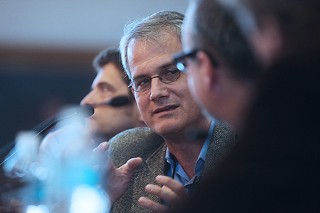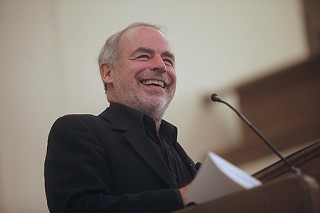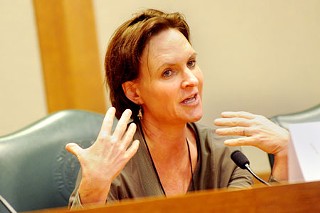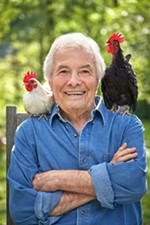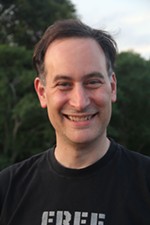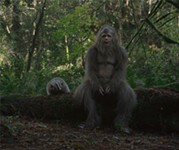Fun for the Whole Family
Traversing the Texas Book Festival
By Kimberley Jones, Fri., Nov. 6, 2009
"They fuck you up, your mum and dad," Philip Larkin once famously wrote, and, yes, I suppose mine did me, if not in particularly interesting ways. But what my parents indisputably did right was put books in my hands at an early age. And they kept them coming: One of the unexpected pleasures of my adult life has been a kind of ongoing all-family book swap. I got them started on Philip Roth; they alerted me to Ian McEwan. (It isn't all sunshine and backslaps: I give them hell for Dan Brown, and they've resisted my overtures of Jane Austen.) I don't remember who turned whom onto Richard Russo, but he's in our blood now, which is why my parents decided to come to town for last weekend's Texas Book Festival to hear Russo speak – and why I found myself on a Saturday morning in the festival's churchiest venue, the Sanctuary, sitting on hard pews in a Methodist chapel, flanked on both sides by Mom and Dad. I had to swipe my teeth for braces to make sure I wasn't, through some sick cosmic twist, suddenly 14 again.
Taking in the venue, Russo wondered at the setting, too: "I've begun to toy with the notion that I'm being toyed with," he began, recounting how he recently appeared at a book fair in Boston as the last-minute sub for a very popular local priest. He was asked to read from a favorite book. What no one told him was that he'd be reading from the pulpit at the landmark Trinity Church. The book he had brought with him? Steinbeck's Cannery Row. "The section I had chosen to read about was Dora Flood's whorehouse."
Russo read a long passage from That Old Cape Magic, which, like so many of his novels, wryly mines the many ways Mum and Dad will – well, you know. He's a vivid reader, but little time was left over for the funny and fleet-footed Russo to answer audience questions.
From there, my parents took off for the Paramount to attend Harvard professor Michael Sandel's panel on justice, which they then raved about all weekend. They offered to give me notes: Dadmentioned the Socratic method, and Mom piped in with something about communitarianism, and my brain started to go soft and buzzing. I opted instead for the panel Writing About Writers for an engaging discussion about literary biography – its frustrations and satisfactions, its methodology, and the authors' fluctuating relationships with their subjects, many of whom have been long dead. Blake Bailey, biographer of John Cheever and Richard Yates and now The Lost Weekend author Charles Jackson, joked, "People think I'm only interested in white guys who were drunk all the time." But he also offered a rather sanguine attitude to take toward his prickly subjects: "I think there's an easy moral to biography writing: To know all is to forgive all."
I then checked out the Cooking Tent, stopping long enough to confirm Lidia Bastianich is just as elegant in person as she is on her PBS show, Lidia's Italy; spotted Kinky Friedman like some exotic bird en route; and rejoined my parents at the Sanctuary to see Texas Monthly's Skip Hollandsworth interview Bryan Burrough (The Big Rich: The Rise and Fall of the Greatest Texas Oil Fortunes). Arriving 15 minutes late to the panel, Burrough, a Temple native, established his Texas bonafides early with a "sorry, y'all," and then launched into a dishy history of the state's famed oilmen. Nearing the end, Hollandsworth lamented that "our generation is not producing the same characters" as those outsized citizens of yore, like Big Rich lead player H.L. Hunt. Burrough offered, with a grimace, Mark Cuban as a contemporary example, but then second-guessed himself: "Can you be called larger-than-life if you Twitter?"
Leaving behind earthbound oil for the intangibles of fiction, I ducked into the Senate Chamber for The World as It Isn't panel, starring Robert Olen Butler. He wasn't the only one on the panel, of course (see also Jonathan Lethem, David Eagleman, and Jim Crace), but he was the only one talking for the brief time I popped in. "Fiction is an art form of human yearning," quoth the Pulitzer Prize winner, and with that, I bowed out to meet up with the parents, already in line for Harold Evans, the legendary newsman, publisher, and now memoirist (My Paper Chase: True Stories of Vanished Times).
Through some combination of his Manchester accent, his soft-spokenness, and maybe his mic placement, Evans wasn't always easy to hear, which was a shame, because he has some damn good stories to tell. He touched on his long editorship at The Sunday Times of London, where he broke major stories on KGB spy Kim Philby and victims of the drug thalidomide. But Evans got the crowd laughing, too, as he recounted his trials as president and publisher of Random House, trying to bully a memoir out of a 300-pound, kimono-clad Marlon Brando. When it was finally finished, Brando balked at doing publicity, deigning only to appear on Larry King's CNN call-in show. "I said, 'Don't do Larry King, because he won't read the book,'" Evans recalled. Brando went on anyway and spent most of the time talking about everything but his memoir. "It was a total disaster," said Evans. "It ended with Marlon kissing Larry on the lips."
Sunday saw a big crowd congregate in the Senate Chamber for David Wroblewski's discussion about his bestselling novel The Story of Edgar Sawtelle. Badly prompted by a fawning moderator, Wroblewski sketched in details about his book for those uninitiated –a mute boy, a dog named Almondine, shades of Hamlet, etc. –but summed up the rest: "Like all stories, it's about how things go wrong." Tragedy was a main theme of the talk, with an inevitable tip of the hat to Shakespeare, whose plays were an inspiration for the first-time novelist, a former software programmer who knocked it out of the park on his first try (if the definition can be stretched to include "12 drafts in 10 to 15 years"). Wroblewski also paid homage to his own dog, Lola, who he insists was not the direct model for Sawtelle's devoted Almondine: "Lola's the kind of dog that would hot-wire a car and go for a joyride if she could."
After the Wroblewski session, my parents said goodbye and hit the road, and I flopped onto the Capitol grounds' green grass to plot out the rest of my day, eyeing a panel on the politics of food and a late-afternoon talk with savage wordsmith Antonya Nelson. Willard Spiegelman's intriguingly titled Seven Pleasures: Essays on Ordinary Happiness sent me hoofing it to the Capitol Extension building, and I sank into a seat in the auditorium with just minutes to spare. But then I looked around and noticed the crowd looked kind of young, which made me wonder, since when do teenagers care about happiness? Well, they don't, duh, but they do care an awful lot about vampires: Turns out I'd stumbled into the panel on the House of Night series, a young-adult bloodsucker saga penned by mother-and-daughter team P.C. and Kristin Cast.
By the time I reoriented myself in the right place, the line to get into the already at-capacity room for Seven Pleasures: Essays on Ordinary Happiness was 10 deep. And then I remembered one of the great boons of being a grownup is that I am the boss of me, and as such can do whatever I want. And what I wanted to do most right then was chuck the rest of the day and curl up in the sun with my dog and a book. And that, dear reader, is exactly what I did.





